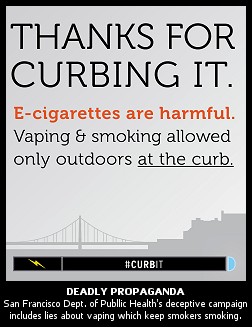 As more city and state legislatures continue to put more lives at risk by inappropriately and dangerously restricting e-cig vaping in the same way they appropriately restrict cigarette smoking, more and more professionals are speaking out against such ill-advised legislation.
As more city and state legislatures continue to put more lives at risk by inappropriately and dangerously restricting e-cig vaping in the same way they appropriately restrict cigarette smoking, more and more professionals are speaking out against such ill-advised legislation.
On am1150 in Kelowna, British Columbia last week, Dr. Christopher Nichols of California State University-Chico talked about exactly that.
Nichols, who is identified by the program's host, Phil Johnson, as "a chemistry professor who analyzes the components of compounds," offers sober points during the short interview (posted in full below) which, if heard by many, could serve to help save millions of lives.
After describing the differences between the dangers of smoking tobacco and the lack of dangers in regard to the vapor produced by an e-cig device, Nichols notes how those nearby someone who is vaping needn't be concerned, even as the anti-smoking industry continues to offer deadly disinformation about e-cigs.
"Second-hand vape has zero things to worry about," he explained. "If students in my classroom were puffing on e-cigs, I would let them be. I don't honestly know what the rules are here on my campus, they probably restrict it, but there's no scientific reason to do that"...
Indeed, the "scientific" basis on which vaping has so far been restricted, frankly, simply doesn't exist. Restricting the use of vaping devices results only in more people continuing to smoke tobacco rather than turning to vaping to help stop a deadly habit that kills almost half a million people in America alone each year.
The propaganda offered as "science" by those banning e-cigs turns out to be pseudo-science at best or, more accurately, not scientific at all. Most of the misguided arguments appear to be based on claims of those who either haven't bothered to read the scientific facts behind vaping, or who have, but simply prefer to lie to the public about it either because they believe vaping "normalizes" a similar-but-totally-different behavior (smoking) they had hoped to have eradicated or --- more cynically --- because hundreds of millions of dollars are made each year by the pharmaceutical companies (Big Pharma) which continue raking in enormous profits as a government-sanctioned nicotine industry (even as their nicotine products have been found to be no more and often less effective for smoking cessation than vaping products)...
"Recent surveys show that the number of smokers who actually fear ecigs more than the deadly, addictive cigarettes that are slowly killing them is rising. The anti-harm-reduction propagandists spread fear of 'second-hand vapor' and 'kid-friendly flavors' and a conspiracy by Big Tobacco to entice and addict young people, via ecigs, to smoking --- the 'gateway effect'", explained Dr. Gilbert Ross in The Hill recently. "The only problem with these alarmist scenarios: all the evidence contradicts it."
"I would much rather be sitting on an airplane next to a guy vaping, then a cigarette addict who can't smoke for six hours and is freaking out," Nichols explains in the radio segment.
He says that his students who vape seem to be taking cues from the way others regard cigarette smoking, even though cigarette smoke produced by burning tobaccos is completely different than the vapor produced by an e-cig: "I think that many of the students are kind of following the lead that people may not want to see them vaping in class because they think --- incorrectly --- that what they're doing is akin to cigarette smoke and that bystanders need to be worried. So, at least the students are sort of taking the initiative and erring on the side of caution, even though, quite frankly, there's nothing at all to worry about."
That fear (or shame) factor --- one that is being dangerously and disingenuously exploited by vaping opponents (ironically, the same community that claims to give a damn about the actual dangers of tobacco, even as they make it harder for people to quit smoking by restricting the use of e-cigs) --- serves only to keep people smoking, rather than quitting by moving to e-cigs. Vaping has been found now in several studies to be among the most effective tools for quitting, even more so than Big Pharma's nicotine products such as patches, gums and, yes, inhalers! (Full Disclosure: Vaping has certainly helped me to quit smoking, literally overnight, after decades of being a very heavy smoker.)
"Treating e-cigarettes like normal cigarettes is making an apple look like an orange," says Nichols, who goes on to compare nicotine's addictive properties (if addiction is seen as a concern) to the similarly addictive properties of caffeine even though, as he correctly observes, Starbucks and many others happily sell it to our children everyday without controversy...
Here's the full segment from Phil Johnson's show last week on Kelowna's am1150...


 Sunday 'Totally Predictable' Toons
Sunday 'Totally Predictable' Toons Democracy STILL Our Best Way Out of This Mess -- And Repubs Know It: 'BradCast' 7/10/25
Democracy STILL Our Best Way Out of This Mess -- And Repubs Know It: 'BradCast' 7/10/25 'Green News Report' 7/10/25
'Green News Report' 7/10/25
 A 'Mass Shooter Subsidy'?: More Dumb, Deadly Stuff in Trump's New Law: 'BradCast' 7/9/25
A 'Mass Shooter Subsidy'?: More Dumb, Deadly Stuff in Trump's New Law: 'BradCast' 7/9/25 Trump's New Law Supersizes ICE, Mass Detention, U.S. Militarization: 'BradCast' 7/8/25
Trump's New Law Supersizes ICE, Mass Detention, U.S. Militarization: 'BradCast' 7/8/25  'Green News Report' 7/8/25
'Green News Report' 7/8/25 Texas Flooding Tragedy Was Both Predictable and Predicted: 'BradCast' 7/7/25
Texas Flooding Tragedy Was Both Predictable and Predicted: 'BradCast' 7/7/25 Sunday 'Big Billionaire Bonanza' Toons
Sunday 'Big Billionaire Bonanza' Toons Sunday 'Total Obliteration' Toons
Sunday 'Total Obliteration' Toons Thank You For Your Attention to This Matter:
Thank You For Your Attention to This Matter: 'Green News Report' 6/26/25
'Green News Report' 6/26/25 Mamdani Primary 'Win' Augurs New Era of Rising Progressives: 'BradCast' 6/25/25
Mamdani Primary 'Win' Augurs New Era of Rising Progressives: 'BradCast' 6/25/25 U.S. Authoritarianism Under-way (But We're Still Here to Fight It): 'BradCast' 6/24/25
U.S. Authoritarianism Under-way (But We're Still Here to Fight It): 'BradCast' 6/24/25 'Green News Report' 6/24/25
'Green News Report' 6/24/25 'Anti-War' Trump Attacks Iran on False Claims About WMD: 'BradCast' 6/23/25
'Anti-War' Trump Attacks Iran on False Claims About WMD: 'BradCast' 6/23/25 Sunday 'Peacemaker' Toons
Sunday 'Peacemaker' Toons Senate Health Care Cuts 'More Extreme' Than House Version: 'BradCast' 6/19/25
Senate Health Care Cuts 'More Extreme' Than House Version: 'BradCast' 6/19/25 'Green News Report' 6/19/25
'Green News Report' 6/19/25 What 'Anti-War President'? MAGA Civil War Over Trump, Iran: 'BradCast' 6/18/25
What 'Anti-War President'? MAGA Civil War Over Trump, Iran: 'BradCast' 6/18/25 Trump's 'Remigration' is Code for 'Ethnic Cleansing': 'BradCast' 6/17/25
Trump's 'Remigration' is Code for 'Ethnic Cleansing': 'BradCast' 6/17/25 Last Weekend Today: 'BradCast' 6/16/25
Last Weekend Today: 'BradCast' 6/16/25 Then They Came for the U.S. Senators: 'BradCast' 6/12/25
Then They Came for the U.S. Senators: 'BradCast' 6/12/25 'Green News Report' 6/12/25: OUR 1,500th EPISODE!
'Green News Report' 6/12/25: OUR 1,500th EPISODE! Lawless Trump Warms Up for Insurrection Act: 'BradCast' 6/11/25
Lawless Trump Warms Up for Insurrection Act: 'BradCast' 6/11/25 Trump Inciting Violence, State of Fear in L.A., Elsewhere: 'BradCast' 6/10/25
Trump Inciting Violence, State of Fear in L.A., Elsewhere: 'BradCast' 6/10/25 Nevermind Elon and Epstein Files, Trump Declares L.A. 'Riots'!: 'BradCast' 6/9/25
Nevermind Elon and Epstein Files, Trump Declares L.A. 'Riots'!: 'BradCast' 6/9/25 'Jesus Weeps' at Trump's 'MAGA Murder Budget': 'BradCast' 6/5/25
'Jesus Weeps' at Trump's 'MAGA Murder Budget': 'BradCast' 6/5/25
 VA GOP VOTER REG FRAUDSTER OFF HOOK
VA GOP VOTER REG FRAUDSTER OFF HOOK Criminal GOP Voter Registration Fraud Probe Expanding in VA
Criminal GOP Voter Registration Fraud Probe Expanding in VA DOJ PROBE SOUGHT AFTER VA ARREST
DOJ PROBE SOUGHT AFTER VA ARREST Arrest in VA: GOP Voter Reg Scandal Widens
Arrest in VA: GOP Voter Reg Scandal Widens ALL TOGETHER: ROVE, SPROUL, KOCHS, RNC
ALL TOGETHER: ROVE, SPROUL, KOCHS, RNC LATimes: RNC's 'Fired' Sproul Working for Repubs in 'as Many as 30 States'
LATimes: RNC's 'Fired' Sproul Working for Repubs in 'as Many as 30 States' 'Fired' Sproul Group 'Cloned', Still Working for Republicans in At Least 10 States
'Fired' Sproul Group 'Cloned', Still Working for Republicans in At Least 10 States FINALLY: FOX ON GOP REG FRAUD SCANDAL
FINALLY: FOX ON GOP REG FRAUD SCANDAL COLORADO FOLLOWS FLORIDA WITH GOP CRIMINAL INVESTIGATION
COLORADO FOLLOWS FLORIDA WITH GOP CRIMINAL INVESTIGATION CRIMINAL PROBE LAUNCHED INTO GOP VOTER REGISTRATION FRAUD SCANDAL IN FL
CRIMINAL PROBE LAUNCHED INTO GOP VOTER REGISTRATION FRAUD SCANDAL IN FL Brad Breaks PA Photo ID & GOP Registration Fraud Scandal News on Hartmann TV
Brad Breaks PA Photo ID & GOP Registration Fraud Scandal News on Hartmann TV  CAUGHT ON TAPE: COORDINATED NATIONWIDE GOP VOTER REG SCAM
CAUGHT ON TAPE: COORDINATED NATIONWIDE GOP VOTER REG SCAM CRIMINAL ELECTION FRAUD COMPLAINT FILED AGAINST GOP 'FRAUD' FIRM
CRIMINAL ELECTION FRAUD COMPLAINT FILED AGAINST GOP 'FRAUD' FIRM RICK SCOTT GETS ROLLED IN GOP REGISTRATION FRAUD SCANDAL
RICK SCOTT GETS ROLLED IN GOP REGISTRATION FRAUD SCANDAL VIDEO: Brad Breaks GOP Reg Fraud Scandal on Hartmann TV
VIDEO: Brad Breaks GOP Reg Fraud Scandal on Hartmann TV RNC FIRES NATIONAL VOTER REGISTRATION FIRM FOR FRAUD
RNC FIRES NATIONAL VOTER REGISTRATION FIRM FOR FRAUD EXCLUSIVE: Intvw w/ FL Official Who First Discovered GOP Reg Fraud
EXCLUSIVE: Intvw w/ FL Official Who First Discovered GOP Reg Fraud GOP REGISTRATION FRAUD FOUND IN FL
GOP REGISTRATION FRAUD FOUND IN FL

































